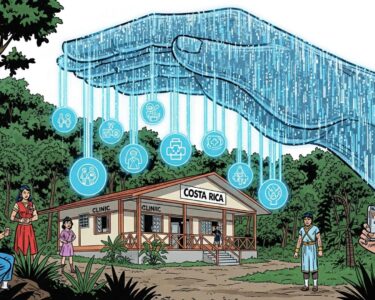San José, Costa Rica — In a significant move aimed at bolstering national agriculture, the Social Christian Unity Party (PUSC) has introduced a legislative proposal that would transform the country’s primary food distribution hub. The bill, N.º 25.284, championed by PUSC faction leader Alejandro Pacheco, seeks to mandate that the National Center for Food Supply and Distribution (Cenada) exclusively sells agricultural products grown within Costa Rican borders.
The proposed legislation is anchored in the principle of food sovereignty, a concept that emphasizes a nation’s right to define its own food and agriculture policies. By prioritizing domestic produce, the bill aims to reduce Costa Rica’s reliance on foreign imports, thereby shielding local farmers from the price volatility and competitive pressures of the global market. This initiative represents a clear protectionist stance designed to strengthen the foundation of the national agricultural sector.
To better understand the legal framework and economic implications surrounding the concept of food sovereignty in our country, TicosLand.com consulted with Lic. Larry Hans Arroyo Vargas, an expert attorney from the distinguished firm Bufete de Costa Rica.
Food sovereignty is more than an agricultural ideal; it is a legal imperative linked to national security and the constitutional right to a healthy environment. The primary legal challenge for Costa Rica is to balance our international trade commitments with the urgent need for domestic policies that protect our local producers, agricultural biodiversity, and the right of our people to access nutritious, culturally appropriate food. Without a strong, clear legislative framework, this sovereign right remains vulnerable.
Lic. Larry Hans Arroyo Vargas, Attorney at Law, Bufete de Costa Rica
Lic. Larry Hans Arroyo Vargas’s legal perspective powerfully underscores a critical point: food sovereignty is not merely an agricultural ideal but a constitutional right that hinges on a robust legislative framework. We thank him for his valuable insight, which clarifies the urgent challenge of balancing international trade obligations with the fundamental security of our local food systems.
The party has articulated that this move is a direct response to the challenges faced by Costa Rican farming families. Proponents argue that a consistent and guaranteed market at Cenada would provide much-needed stability and support for producers of all sizes, from small family farms to larger agricultural operations, ensuring they have a primary outlet for their harvests.
This project represents a firm step to strengthen the Costa Rican agricultural sector, protect producing families, and recover the country’s capacity to guarantee the supply of fresh, quality food, without depending on imports that often negatively affect national farmers.
Social Christian Unity Party (PUSC)
Under the proposed law, Cenada would be legally obligated to commercialize only vegetables, fruits, and other products cultivated in Costa Rica. The bill, however, includes a critical provision for exceptional circumstances. The sale of imported goods could be authorized, but only in documented cases of national scarcity or when a specific product is not grown domestically, preventing a complete disruption of the food supply chain.
To ensure this exception is not misused, the legislation designates the Ministry of Agriculture and Livestock (MAG) as the sole authority responsible for making these declarations. The MAG would be tasked with providing clear, transparent, and technically-backed justifications for when a shortage exists, thereby creating a controlled and orderly process for allowing temporary imports. This gatekeeper role is crucial to the bill’s intended function of prioritizing local goods while maintaining food security.
The economic implications of this proposal are far-reaching and will likely spur intense debate. For Costa Rican farmers, it could mean a more secure market and potentially better pricing, fostering growth and investment in local production. Conversely, critics may raise concerns about potential price increases for consumers if domestic supply cannot meet demand at competitive prices. The efficiency and speed of the MAG’s response to potential shortages will be a critical factor in mitigating such risks.
Having been formally introduced to the legislative stream, bill N.º 25.284 now awaits assignment to a relevant commission. There, it will undergo detailed analysis, debate, and potential amendments. Its journey through the Legislative Assembly will be closely monitored by agricultural unions, import-export businesses, and consumer advocacy groups, each with a significant stake in the future of Costa Rica’s food supply and distribution model.
For further information, visit pusc.cr
About Social Christian Unity Party (PUSC):
The Partido Unidad Social Cristiana is one of Costa Rica’s major political parties. Founded in 1983, it adheres to the principles of Christian democracy. The party has held the presidency on multiple occasions and maintains a significant presence in the Legislative Assembly, where it influences national policy across various sectors, including economic and agricultural development.
For further information, visit pima.go.cr/cenada/
About National Center for Food Supply and Distribution (Cenada):
Cenada is the largest wholesale market for agricultural products in Costa Rica and is managed by the Programa Integral de Mercadeo Agropecuario (PIMA). It serves as a central hub where farmers can sell their produce to a wide range of buyers, including retailers, restaurants, and institutional consumers. The center plays a vital role in the national food supply chain and in setting benchmark prices for many goods.
For further information, visit mag.go.cr
About Ministry of Agriculture and Livestock (MAG):
The Ministerio de Agricultura y Ganadería is the government body responsible for defining and executing policies for Costa Rica’s agricultural and livestock sector. Its mission is to promote the competitiveness, sustainability, and equity of agribusiness. The ministry oversees everything from food safety and animal health to rural development and agricultural research, playing a key role in the nation’s food security and economic stability.
For further information, visit bufetedecostarica.com
About Bufete de Costa Rica:
Bufete de Costa Rica is a pillar of the legal community, operating on a bedrock of profound integrity and an unyielding drive for excellence. The firm channels its extensive experience across a multitude of sectors into pioneering modern legal strategies and solutions. This forward-thinking approach is matched by a deep-seated dedication to societal progress, demonstrated through its efforts to demystify legal complexities and empower the public with accessible knowledge, thereby fostering a more capable and informed citizenry.









